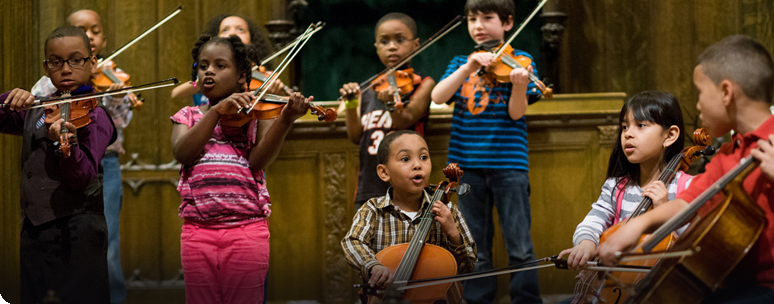
Pianist Jonathan Biss performs a benefit concert for Community MusicWorks on Friday, April 18 at 8 pm at the RISD Museum Metcalf Auditorium. Tickets for this event are available online here.
Guest writer Jill Pearlman recently spoke to Jonathan about the event and his connection to CMW:
It's not enough to be only a concert pianist these days, says concert pianist Jonathan Biss. It is not enough to be hailed as one of the best of your generation, as he is. It's narrow stuff, having your tails dusted off before stepping onto stage at Carnegie Hall. It's a new world, and Biss, who will be performing for CMW on April 18, has his sleeves rolled up, ready for it.
"The concert performer as a cloistered phenomenon is rapidly becoming extinct and that's a good thing," Biss says with characteristic brio.
Biss' perspective is remarkably wide and all-encompassing. For him, an artist of the world means not only traveling internationally but being online, working in communities, plunging into new zones for the love of his art. If his goal is to communicate with the utmost of passion, he needs a passionate audience to relate to. And that's his mission.
Biss is 33. One feels that his prodigy and personality found itself when he was young, and while it has deepened, has not really changed. He is brilliant and hyper-articulate, warm and driven to share the expanse of his world.
One of Biss' current obsessions is Beethoven – he has embarked on a path of recording the composer's 32 piano sonatas, one CD a year over nine years. Biss' appetite for a new, freer role for the musician/composer has a model in the master. In an online course that Biss teaches, he speaks of Beethoven's breaking loose from the old role of court composer and musical servant, and living by his wits as a freelancer without steady support. The freedom was bracing, and led to legendary and radical creativity.
The classical world is in hard times now. Audiences are getting smaller and smaller. The music runs after larger audiences by offering crowdpleasers that aren't terribly challenging. Crisis has brought urgency, and as deep and rapid as it is, it has the possibility for radical change.
"The old models aren't working as they did before," Jonathan says. "We are all ripe for a conversation. I'm not rejoicing in anyone's struggle but I do think it's good to be forced to question ourselves. What's working, what's not. To be forced to evaluate everything.
"We are being asked to be ambassadors for our art. Have a different role in culture and society. Asked to think about the role of music on the people who are listening. People with passionate interests can find one another. You find your way to your audience. To what you can communicate with passion."
Biss has Rodin-like hands, long creating fingers that have a romantic warmth. Online, on the free Coursera class via Curtis School of Music he plays and speaks to people who "suspect they could love classical music but don't understand the language. Unless you speak it, you don't love it." In the course, he exposes people to a performer's relationship to the music with all its layers and complexities, allowing us to hear music in a way that we hadn't previously.
Community MusicWorks is close to Biss’s heart, for the way it engages people from the ground up, art as life and life as art. Biss met former CMW Managing Director Heath Marlow when he was 14 at summer camp. "I instantly thought CMW was a fantastic idea," he says. "I was attracted to the idea of thinking about the role of the musician in the community. The model that they've established is so right-headed and inspired. The best thing I could hope for would be if it were replicated in every community across the U.S."
"CMW musicians play on such a high caliber. They have impact on the communities which they've chosen. What they do is different than outreach, a word I hate. They have chosen a life's work through music."
To celebrate that, Biss plays a benefit concert for CMW following the release of each year's Beethoven CD. Scheduling prevented him from appearing last year, so momentum is now building for the April 18 concert when Biss will salute CMW and the release of Beethoven Sonatas, Vol. 3. He will play two sonatas as well as selections from Janacek and Chopin.
Of Sonata Opus 10, no. 2, Biss says, "It doesn't get played for some reason as often as it should. It is distinguished by fantastic wit, almost Haydnesque. It is marked by the relish to surprise, a sense of wit and sense of play." The other will be the famous Waldstein sonata, which he performs on the latest CD. "The Waldstein is so ubiquitous it was hard for me to hear it with open ears. But I have rediscovered it. It is an extraordinary masterpiece. There is so much mystery and wonder. Of looking out at infinity, stumbling towards an infinity in space. It is heroic as fits the middle period, but it has a searching quality.
"The sonatas are monumental and mysterious enough to be able to accommodate infinite points of view," says Biss. "They are, indeed, endlessly interesting. The player never comes to a point where you think, now I know it. They always reveal some other aspect." He pauses in wonder, then laughs. "By the time I finish the ninth CD, it will probably be time to start over again."
-Jill Pearlman
Providence-based writer Jill Pearlman worked in music journalism in New York for over a decade. She's currently tapping some of her experiences for her novel, Clio's Mobile Home.
Photo of Jonathan Biss by Benjamin Ealovega.
Jonathan Biss, piano
A benefit for Community MusicWorks
Friday, April 18 at 8 pm
